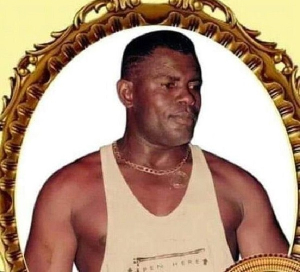He was the biblical Sampson of his day, and his story is a mixture of bravery and notoriety. He was a defender of the poor and vulnerable and a model figure for citizen vigilantism in Kumasi, specifically Buokrom.
Owing to his much-touted strength and bravery, which made him an ‘area champion’ in Kumasi in the 90s, his real name, Yaw Aboagye, was trumped by nicknames like Budo, Joe Kutani, Ali Joe, and Wofa oo Wofa.
Budo was the ish back in the day. His exploits in his area made his name soar in every nook and cranny of Kumasi; he was feared and admired in equal measure.
Residents of Kumasi who first witnessed his act of vigilantism, which he sometimes leveraged to do unfortunate things, remember him fondly for a variety of reasons.
To some residents of Kumasi, he was the number one protector of the vulnerable in Buokrom and went out of his way to ensure that his area was immune from all criminal activities, particularly robbery.
It is said that when someone was robbed in Buokrom, all he needed to do was see Budo and give him detailed information about the incident. Within an hour, Budo miraculously retrieved the item and returned it to the victim for free.
‘One man’ Budo, it is said, singlehandedly fought off armed robbery attacks in Buokrom and made the place a safe haven for all residents.
Kumasi history remembers him as the man who, on one hot afternoon, blocked an entire road to traffic and took money from drivers. The money accrued from this unlawful yet brave action was distributed to some poor women in the Buokrom area.
He was a friend to every child and often charmed them with his stories and selfless gestures. If a child in the neighbourhood craved toffee, the confectionery shops in the area would not be his first resort; Budo’s house was.
Aided by perceived special powers that gave him strength and made it impossible for him to suffer any gunshot or cutlass injuries, Budo won several battles for his area and became a cult hero for his people.
So highly was he regarded that married women who were abused by their husbands or suffered issues in their marriage ran to Budo for him to instil ‘the fear of God’ in their husbands.
Budo was hugely celebrated in Buokrom and Kumasi, but he was never a saint. Amid all these remarkable works of positive ‘gangsterism,’ there were underlining issues of criminal allegations against Budo.
How Budo died
To most who knew about him, Budo was immortal. In their minds, there was no way Budo was going to die, but on August 31, 2004, they had the shocks of their lives when news broke that Budo had died.
According to reports, Budo was killed by his uncle over some land litigation. His uncle was looking to develop a family land, but Budo stood in his way.
Aware of Budo’s spiritual powers that made it impossible for him to be killed by a normal bullet, the uncle is said to have sought help from one of Budo’s rivals and a fetish priest who advised that grains of rice be put into the gun before firing.
On August 31, 2004, the uncle activated this advice and shot his nephew.
Budo, as has been said, was far from a saint-like figure as he had his flaws, which sometimes led to clashes with the law, but he is well remembered as a vigilante who stood and fought for his people.
This article was first published on GhanaWeb.com on Sunday, July 3, 2022
General News of Tuesday, 23 April 2024
Source: www.ghanaweb.com
Bravery and Notoriety: The story of Budo, a famous Kumasi vigilante whose death rocked Asanteman
Entertainment
















